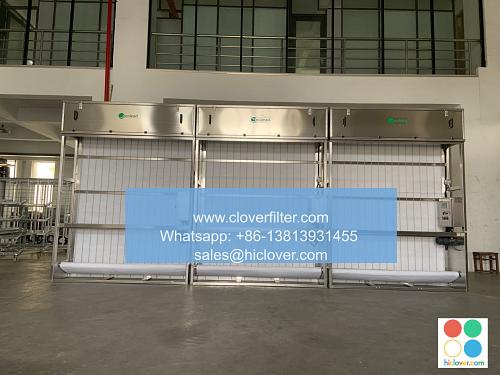Streamlining Food Production: The Importance of Automatic Roll Air Filters in Nestlé Factories

The food production industry, particularly in large-scale factories like those of Nestlé, relies heavily on efficient and hygienic processes to ensure the quality and safety of their products. One crucial aspect of maintaining a sanitized environment is the implementation of advanced air filtration systems, such as automatic roll air filters. These filters play a key role in streamlining food production, enhancing indoor air quality, and preventing contamination risks in various application areas within the factory.
Introduction to Automatic Roll Air Filters
Automatic roll air filters are designed to capture airborne particles, such as dust, pollen, and other contaminants, that could potentially compromise food quality. These filters are characterized by their self-cleaning and automatic replacement mechanisms, which ensure continuous operation without the need for manual intervention. This feature is particularly valuable in high-production environments like Nestlé factories, where uninterrupted manufacturing processes are essential for meeting consumer demand and maintaining supply chain efficiency.
Key Benefits in Food Production Environments
The incorporation of automatic roll air filters in Nestlé factories offers several benefits that contribute to optimal food production and quality control:
– Enhanced Product Safety: By removing airborne contaminants, these filters significantly reduce the risk of product contamination, thereby ensuring the safety and quality of the food products.
– Increased Efficiency: Automated filter systems minimize downtime and labor costs associated with manual filter maintenance, allowing for continuous production and improved productivity.
– Compliance with Regulatory Standards: The use of advanced air filtration systems helps Nestlé factories comply with stringent food safety and hygiene regulations, such as those set by the FDA and similar international bodies, enhancing regulatory compliance and reputation management.
– Reduced Energy Consumption: Modern automatic roll air filters are designed to be energy-efficient, which can lead to cost savings and a reduced carbon footprint, aligning with Nestlé’s sustainability goals and environmental responsibility initiatives.
Application Areas Within Nestlé Factories
The utility of automatic roll air filters extends across various departments and processes within Nestlé factories, including:
– Packaging Areas: To prevent dust and other particles from contaminating packaging materials and finished products.
– Food Processing Departments: Where raw materials are handled and processed, requiring a high level of air purity to prevent contamination.
– Storage and Warehouse Facilities: Maintaining clean air in these areas is crucial for preserving the quality of stored ingredients and finished goods.
– Research and Development Laboratories: Clean air is essential for accurate testing and experimentation, ensuring the development of high-quality products.
Conclusion
The integration of automatic roll air filters into Nestlé factories represents a significant step forward in streamlining food production processes, emphasizing quality control, efficiency, and compliance. By leveraging these advanced filtration systems, Nestlé can enhance product safety, reduce operational costs, and contribute to a sustainable manufacturing practice, ultimately reinforcing its commitment to delivering high-quality food products to consumers worldwide. As the food industry continues to evolve, the importance of innovative air filtration solutions like automatic roll air filters will only continue to grow, playing a vital role in future-proofing food production and ensuring the well-being of consumers.

